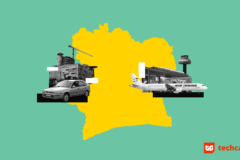Noel K. Tshiani is the founder of Congo Business Network. In this exclusive interview for TechCabal, he discusses with Patrice Binwa Aganze, founder of Naledi Services, about the startup environment in Goma, the 3rd most populous city in the Democratic Republic of Congo.
Can you tell us about your background and how it has prepared you to be an entrepreneur in Goma, in the Democratic Republic of Congo?
I may surprise you but I did not study formal computer science. I am an economist specialising in the financial management of organisations. I studied financial management at the Faculty of Economics at the University of Goma. I started my professional career while still a student, between 2008-2010, as an accountant for a not-for-profit organisation that worked for the socio-economic reintegration of girl mothers (following early marriage or childbirth) and vulnerable children.
This experience allowed me to combine theory and practice. I believe that this is where my passion for the productive use of computers was born and my concern to find solutions to automate the workflow and reduce the risk of errors. I taught myself to become a webmaster with solutions that were called at that time “what you see is what you get”, the precursors of today’s no-code.
After finishing my university studies and working as a freelancer, I joined another non-profit organisation for 3 years, the Alpha Ujuvi Collective, first as a Communication Officer where my work contributed to the award for the organisation of the UNESCO International Confucius Prize for Literacy in 2010.
Then I was promoted to the position of Administrative and Financial Director. At the Alpha Ujuvi Collective, we were already using the Sage accounting software on the recommendation of donors and auditors. But it did not meet the needs of users because it was too complex. There were frequent delays in reporting and difficulties using it. Also, the consultant came from a foreign country.
From there I went to work at Trust Merchant Bank in 2012, where I learned a lot about business acumen because I was in a sales role that allowed me to be in constant contact with corporate and retail clients. It was exactly there that I became aware of the immense problem to be solved to improve the management of SMEs and startups.
As an advisor to my clients, I was aware of the lack of tools to facilitate the work of their agents, to share financial information, and reduce risks of losses and fraud. So until the opposite, we had state-of-the-art software as a banker. Of course, SMEs don’t have the same means, but there should be a solution adapted to their needs and capabilities.
And so that’s how I left banking to create my business called Naledi Services in 2014 with the purpose of providing information technology products and services to SMEs and startups. We set up a team of information technology and salespeople (friends who had just finished their studies abroad and in Congo). The needs of the customers were huge, and we had to do everything such as online marketing, software, network, maintenance, and training.
Because we were the first formal company offering these services in Goma, fortunately, it seems that we have inspired many young people in the tech ecosystem to specialise in one or another field. Of course, I continue my self-training and moreover, I came back to school to learn software development and computer systems at the Dynamic Asymmetric Centre in Kampala, Uganda and in Rwanda. I can’t count the number of online training that are now part of my lifestyle. One can just mention courses on business management at the University of London through Coursera and at Harvard University’s HarvardX as some examples of self-education I have taken to improve my knowledge and skills.
What inspired you to start your current startup, and what solution does it offer in the market?
Naledi Services was created to provide solutions that improve the management of SMEs and startups. Our slogan says it best: “Think IT, Get IT”. We have noticed that many people start their businesses with the buzz around entrepreneurship, but the vast majority of Congolese SMEs do not have management tools adapted to their business. The current situation leaves companies vulnerable to various risks, which can have severe consequences. These risks include:
1. Theft and losses: When financial and operational information is not channelled appropriately, companies become vulnerable to theft and revenue losses. This can result in significant financial shortfalls that can be difficult to recover from.
2. Inefficient management: Companies may struggle to control their activities, personnel, or costs due to a lack of proper oversight. This can lead to inefficiencies and ultimately impact the company’s bottom line.
3. Limited access to credit: Companies without a solid financial history may struggle to obtain credit due to a lack of financial data. Bankers may find it difficult to evaluate the creditworthiness of these companies, which can limit their ability to secure loans or other forms of credit.
4. Legal and fiscal sanctions: Bookkeeping is a legal obligation for companies of all sizes. Failure to maintain accurate records can result in legal and fiscal sanctions, which can be costly and damaging to the company’s reputation.
It is important for companies to take steps to address these risks and protect their business. This may involve implementing robust financial management systems, investing in proper oversight and control mechanisms, and ensuring compliance with legal and fiscal requirements. By taking proactive measures, companies can mitigate their exposure to risk and safeguard their financial health.
We have developed a solution called Reflet. It is a complete management software for companies selling services and trade. It offers solutions for stock management, invoicing, customer loyalty points, and cash flow. Reflet software is available in several versions that are designed to cater to different sizes of companies. These versions are categorised into micro, small, medium, and large based on the size of the companies that they are intended for.
Further, Reflet software is available for various types of businesses, including services, supermarkets, food outlets, bars, restaurants, pharmacies, kiosks, stores, garages, and sewing shops. The software can be accessed both online and offline on a variety of devices, including computers, laptops, tablets, and smartphones. This means that users can access the software from virtually anywhere and on any device that they prefer.
How would you describe the business environment in Eastern DRC, and what challenges have you faced while running your startup in this region? Can you speak about the opportunities as well?
Unfortunately, our region is better known in the world because of repeated conflicts that have been going on for almost 3 decades. And yet we are in the most dynamic part of the country in terms of resilience and youth entrepreneurship. Of course, the big international groups are not present, but this gap has been filled by local players (real estate, hotels, mass distribution, energy, and services). It is a region open to countries in East Africa (Rwanda, Uganda, Kenya, Tanzania, South Sudan), South Africa, Dubai, and China.
The first challenge is the negative publicity of the media, which only reports news about insecurity, yet other aspects of life continue as normal. The second challenge is the infrastructure that has yet to be developed. This limits the movement of people and goods (between the city and rural areas) with an impact on the cost of these goods for consumers. For example, most people can only travel by plane to reach Kinshasa, Lubumbashi, Kisangani, and Kindu. Of course, all this has as a consequence the increase of the risk that our businesses are exposed to compared to those who live in Kinshasa or Lubumbashi for example.
Speaking of opportunities, only a few have understood this magnitude. But the Eastern Congo region represents the future of this country. First, because of its youthfulness, it is acquiring more and more experience thanks to the international non-profits that have been present for several years and the influence of the English-speaking countries in East Africa. Access to cell phones, internet penetration and the adoption of mobile money are major assets in the eastern part of the DRC.
Goma is home to some of the largest startups in Congo (Altech which has just raised $18 million, Nuru, BBox Capital, Virunga, the Congolese Water and Electricity Distribution Company, and the Congolese Microcredit Company, which is the second largest microfinance company in Congo after FINCA). Another advantage of the region is its dynamic population, which is always on the move, making international and long-distance travel a norm. Additionally, the entrepreneurial ecosystem in the region is continuously evolving, with an increasing number of small and medium-sized enterprises being established, leading to the creation of various industries and services.
The high population density is yet another factor that contributes to the region’s potential for growth. The Eastern Congo region has rich volcanic ash soil, which makes agriculture a strong sector in the region. The subsoil in the region is also rich in rare and unique minerals such as coltan, cassiterite, tourmaline, tin, gold, and much more. Additionally, the region has a significant potential for tourism, as it is home to the oldest national park in Africa, the Virunga National Park, which boasts rare species like mountain gorillas, and the Maiko Park, which has its Okapi.
Speaking of technology, the region’s proximity to the East African Community has facilitated the deployment of 4G and fibre optics, which has vastly improved the quality of internet connectivity. It is worth noting that Goma has a better internet connection than Kinshasa, particularly in terms of household coverage.
How have you seen the startup ecosystem evolve in the DRC over the past few years, and what opportunities do you see for growth and development in the future? Which tech solutions are most needed now by consumers in Goma and around the country?
The startup ecosystem in the DRC is gradually taking shape, and we are pleased to see that the government is becoming more aware of the potential of this sector. Recently, we have witnessed the creation of dedicated ministries for entrepreneurship and digital affairs, as well as an agency for the development of the digital sector. Additionally, the adoption of the Startup Act and the law on the digital economy, along with several private sector initiatives reflect a positive attitude towards the growth of the startup ecosystem.
However, there is still a lot of work to do, and it presents an opportunity for the government to utilise local knowledge. Unfortunately, Congolese leaders often look to foreign countries for solutions, despite the availability of expertise in these areas. In the eastern part of the DRC, access to cell phones, internet penetration, and the widespread adoption of mobile money are significant assets. There is plenty of room for other players to add to the existing tech offerings, such as software solutions like Reflet to help SMEs manage their businesses.
The fintech field also has enormous potential, given that banks are only present in big cities, and a vast majority of the population does not have access to them. Some young people have already introduced a solution to pay for electricity via a cellphone, which is an important step forward. The field of money transfer also has huge potential, considering the volume of transactions that take place with countries in the East African Community, Dubai, China, and other parts of the country.
Other areas with potential for growth include multilingual education with new e-learning applications, tourism promotion, renewable energy, digitalisation of local and fiscal administrations, and traceability of minerals.
What do you think needs to be done to make it easier for entrepreneurs in the DRC to raise money from international investors, and what role do you think the government can play in this process?
To support the growth of tech entrepreneurship in Congo, several key actions are needed. First, it is crucial to give these entrepreneurs the visibility they deserve, by showcasing their work at national and international events and conferences. This will help to put Congo on the map as a key player in the African tech scene, alongside countries such as Kenya, South Africa, Nigeria, and Egypt.
In addition, there are several practical steps that can be taken to support the growth of the tech ecosystem. For example, lobbying the Central Bank of Congo to improve the financial system and facilitate the movement of capital would be a positive move, as currently an export licence is needed for transfers over $10,000.
Another key step would be to establish a stock market where investors can easily exchange shares in companies. This would provide a crucial source of funding for entrepreneurs, who need access to capital to grow their businesses. At the same time, entrepreneurs themselves need to be made aware of the importance of running their businesses with transparency and high-quality human resources. This is essential to raise funds successfully.
To facilitate access to international investors, it is important for entrepreneurs and the government to adopt English as a language of business and to comply with International Financial Reporting Standards. This will enable Congolese companies to meet the evaluation criteria of English-speaking investors.
Finally, it is important to implement reforms that have already been agreed upon, such as the new laws that support tech entrepreneurship and that lay the frameworks for the tech sector. Lobbying to have Congo added to the directories of major tech companies such as Google, Apple, Facebook, Amazon, and Microsoft would be beneficial, as it would enable entrepreneurs to access these vital online services without the need for a virtual private network.





















